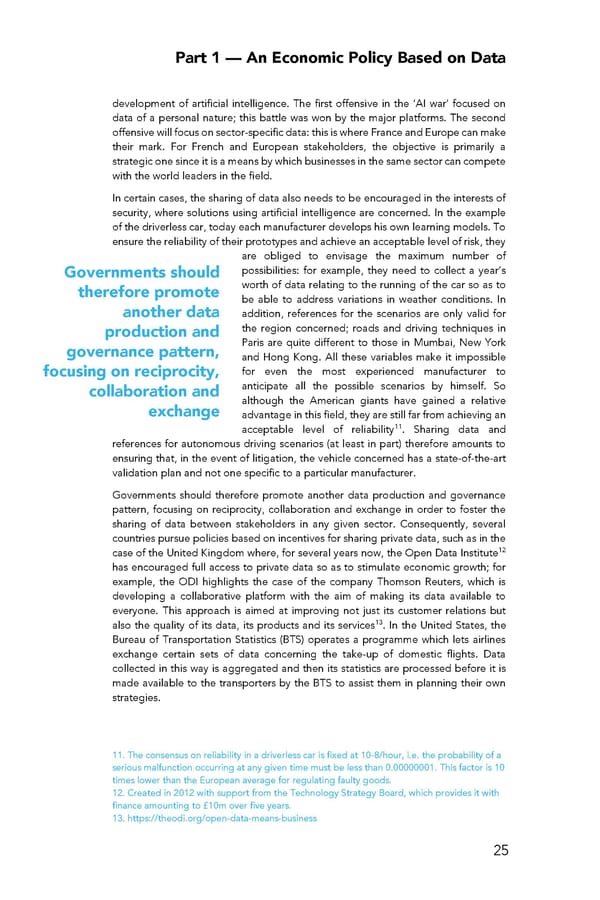Part 1 — An Economic Policy Based on Data development of artificial intelligence. The first offensive in the ‘AI war’ focused on data of a personal nature; this battle was won by the major platforms. The second offensive will focus on sector-specific data: this is where France and Europe can make their mark. For French and European stakeholders, the objective is primarily a strategic one since it is a means by which businesses in the same sector can compete with the world leaders in the field. In certain cases, the sharing of data also needs to be encouraged in the interests of security, where solutions using artificial intelligence are concerned. In the example of the driverless car, today each manufacturer develops his own learning models. To ensure the reliability of their prototypes and achieve an acceptable level of risk, they are obliged to envisage the maximum number of Governments should possibilities: for example, they need to collect a year’s therefore promote worth of data relating to the running of the car so as to be able to address variations in weather conditions. In another data addition, references for the scenarios are only valid for production and the region concerned; roads and driving techniques in governance pattern, Paris are quite different to those in Mumbai, New York and Hong Kong. All these variables make it impossible focusing on reciprocity, for even the most experienced manufacturer to collaboration and anticipate all the possible scenarios by himself. So exchange although the American giants have gained a relative advantage in this field, they are still far from achieving an 11 acceptable level of reliability . Sharing data and references for autonomous driving scenarios (at least in part) therefore amounts to ensuring that, in the event of litigation, the vehicle concerned has a state-of-the-art validation plan and not one specific to a particular manufacturer. Governments should therefore promote another data production and governance pattern, focusing on reciprocity, collaboration and exchange in order to foster the sharing of data between stakeholders in any given sector. Consequently, several countries pursue policies based on incentives for sharing private data, such as in the 12 case of the United Kingdom where, for several years now, the Open Data Institute has encouraged full access to private data so as to stimulate economic growth; for example, the ODI highlights the case of the company Thomson Reuters, which is developing a collaborative platform with the aim of making its data available to everyone. This approach is aimed at improving not just its customer relations but also the quality of its data, its products and its services13. In the United States, the Bureau of Transportation Statistics (BTS) operates a programme which lets airlines exchange certain sets of data concerning the take-up of domestic flights. Data collected in this way is aggregated and then its statistics are processed before it is made available to the transporters by the BTS to assist them in planning their own strategies. 11. The consensus on reliability in a driverless car is fixed at 10-8/hour, i.e. the probability of a serious malfunction occurring at any given time must be less than 0.00000001. This factor is 10 times lower than the European average for regulating faulty goods. 12. Created in 2012 with support from the Technology Strategy Board, which provides it with finance amounting to £10m over five years. 13. https://theodi.org/open-data-means-business 25
 For a Meaningful AI - Report Page 25 Page 27
For a Meaningful AI - Report Page 25 Page 27